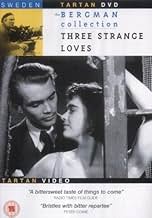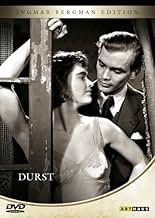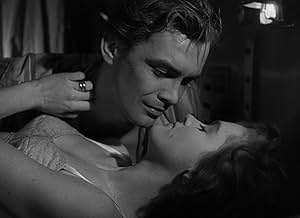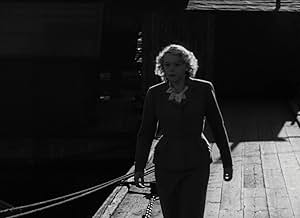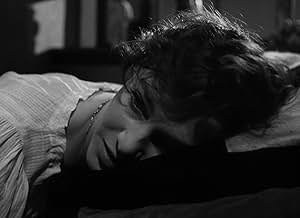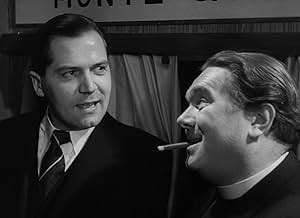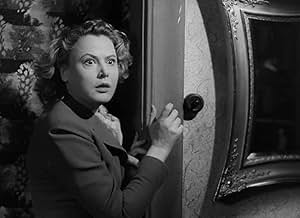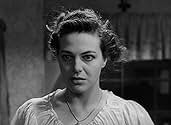IMDb RATING
6.5/10
3.1K
YOUR RATING
A needy couple in a bad marriage travel back to Stockholm after a trip to Italy. Meanwhile, a widow resists seductions from two different persons - her psychiatrist and a lesbian friend.A needy couple in a bad marriage travel back to Stockholm after a trip to Italy. Meanwhile, a widow resists seductions from two different persons - her psychiatrist and a lesbian friend.A needy couple in a bad marriage travel back to Stockholm after a trip to Italy. Meanwhile, a widow resists seductions from two different persons - her psychiatrist and a lesbian friend.
- Director
- Writers
- Stars
Mimi Nelson
- Valborg - Ruts kamrat i balettskolan
- (as Mimmi Nelson)
Wiktor Andersson
- Doorkeeper
- (uncredited)
Verner Arpe
- Tysk biljettsamlare
- (uncredited)
Ingmar Bergman
- Tågpassagerare
- (uncredited)
Britta Brunius
- Sjuksköterskan efter Ruts abort
- (uncredited)
Calle Flygare
- Den danske prästen på tåget
- (uncredited)
Inga Gill
- Lady at Hotel
- (uncredited)
Herman Greid
- Stadsbudet i Basel
- (uncredited)
Helge Hagerman
- Den svenske prästen på tåget
- (uncredited)
- Director
- Writers
- All cast & crew
- Production, box office & more at IMDbPro
Featured reviews
Bergman is beginning to develop some of his personal traits to be found in the later, more mature film. He hasn't yet learned to unveil the characters quite yet but the interactions are quite interesting. There are several stories going on here and a couple of groups of characters and sometimes the switching back and forth can be confusing. I would certainly agree with one reviewer that "thirst" was used not only metaphorically throughout but quite literally from the first image of an eddy of water during the credits to the very end. The characters are always drinking something or other - water (it's midsummer after all), wine(one of the characters is an alcoholic), even milk. The characters are actually quite self-centered, as in so many of Bergman's earliest films, and not particularly likable. The scene with the "therapist" was especially disturbing and the characters seem more prone to bounce off each other than anything. It's when they start to communicate that the trouble really begins to brew as we've learned from the later films.
Curtis Stotlar
Curtis Stotlar
Interesting film, but this is clearly not the very best of the great Bergman. Several relationships are examined under the microscope (so far, so Bergman). The film jumps around between the relationships in a slightly distracting way, but eventually you get to the bottom of who used to be with whom etc.
Gosh it's bleak out there, Bergman seems to share Strindberg's views on marriage and relationships at this time - the references to Strindberg stress that point. There's adultery, bitter rows between partners, lesbianism (inexplicit) and suicide. It ought to have me at the edge of my seat, but somehow doesn't quite do the business for me in the way that most Bergman films do. Perhaps this one hasn't aged well.
Worth seeing for the dedicated Bergman fan - it's pretty short and has its moments. If you are looking for an initial view of Bergman, look elsewhere.
Gosh it's bleak out there, Bergman seems to share Strindberg's views on marriage and relationships at this time - the references to Strindberg stress that point. There's adultery, bitter rows between partners, lesbianism (inexplicit) and suicide. It ought to have me at the edge of my seat, but somehow doesn't quite do the business for me in the way that most Bergman films do. Perhaps this one hasn't aged well.
Worth seeing for the dedicated Bergman fan - it's pretty short and has its moments. If you are looking for an initial view of Bergman, look elsewhere.
I thought I had seen every Bergman film ever made, so I was thrilled to stumble onto this one the week after he died. I had no trouble following the intertwining stories because I kept track of the characters' names and their relationships. So what confused many viewers seemed totally justified, especially compared to films in our post-Altmam era where more and more we see "stories" where seemingly unconnected people's lives crisscross and are junxtaposed ("Magnolia," and "Babel" to name a few).
The filming is fantastic for the time and prefigures the use of close ups in "Through a Glass Darkly." Very different from "Port of Call" just before and "To Joy" just afterwards. I found the film less bleak than "Prison," its lyrical moments prefiguring "Summer Interlude," one of my favorite early Bergmans.
The lesbianism was blatant enough for me, much more obvious than in "Young Man With A Horn," made around the same time in the US. Curiously, this section of the film helped illuminate Bergman's use of the theme in "The Silence," and this makes me want to view that film again. The fact that this is a film Bergman didn't write is intriguing, because he harmonizes his visual language to the rhythms of the screenwriter's oral one. The dialog was rather light for the seriousness of the situations. Perhaps Bergman himself would have been heavier-handed.
Lastly, there are the actresses, and here Bergman's direction of actors seems to solidify, as I find his previous films much more uneven on this score. Here the women, especially the young dancer, show real depth.
Keep in mind that this is not his first film, but still an early work, a seed that will grow into later masterpieces. Then you won't be disappointed, even after the mediocre last minutes of a work that definitely showed promise.
The filming is fantastic for the time and prefigures the use of close ups in "Through a Glass Darkly." Very different from "Port of Call" just before and "To Joy" just afterwards. I found the film less bleak than "Prison," its lyrical moments prefiguring "Summer Interlude," one of my favorite early Bergmans.
The lesbianism was blatant enough for me, much more obvious than in "Young Man With A Horn," made around the same time in the US. Curiously, this section of the film helped illuminate Bergman's use of the theme in "The Silence," and this makes me want to view that film again. The fact that this is a film Bergman didn't write is intriguing, because he harmonizes his visual language to the rhythms of the screenwriter's oral one. The dialog was rather light for the seriousness of the situations. Perhaps Bergman himself would have been heavier-handed.
Lastly, there are the actresses, and here Bergman's direction of actors seems to solidify, as I find his previous films much more uneven on this score. Here the women, especially the young dancer, show real depth.
Keep in mind that this is not his first film, but still an early work, a seed that will grow into later masterpieces. Then you won't be disappointed, even after the mediocre last minutes of a work that definitely showed promise.
Raul's a dislikeable chap, gets the feeling that he's being trapped, in the blink of an eye, it's adios, goodbye, marches off vowing not to come back.
Ruth is quite high maintenance, takes everything that you can dispense, she'd turn you to a husk, grinding you down to dust, at her mercy without strong defence.
Bertil's nightmare hasn't come true, the bottle he threw he withdrew, a small recompense, brings him back to sense, but next time he might not wake to two.
Valborg plays life solitaire, her secret her shame not to share, though with Eva she tries, it all ends in surprise, back to solitude with no one to care.
Eva is lost all alone, a vulnerable hand she's been sown, now she's starting to fade, as she tries to evade, cascades to the depths as if blown.
Several intertwined strands reflect the frailties, the ignorance and the disappointments we've all encountered at some time or another - although hopefully with a little less melodrama.
Ruth is quite high maintenance, takes everything that you can dispense, she'd turn you to a husk, grinding you down to dust, at her mercy without strong defence.
Bertil's nightmare hasn't come true, the bottle he threw he withdrew, a small recompense, brings him back to sense, but next time he might not wake to two.
Valborg plays life solitaire, her secret her shame not to share, though with Eva she tries, it all ends in surprise, back to solitude with no one to care.
Eva is lost all alone, a vulnerable hand she's been sown, now she's starting to fade, as she tries to evade, cascades to the depths as if blown.
Several intertwined strands reflect the frailties, the ignorance and the disappointments we've all encountered at some time or another - although hopefully with a little less melodrama.
Women on the verge of a nervous breakdown, men looking for dominance, acted out on a small scale: Here, Bergman serves up some technical and contentual elements which can be found throughout his later career. Several short stories written by Birgit Tengroth, who is playing Viola here, are melded, with the main plot involving Rut (Eva Henning) and Bertil (Birger Malmsten). But as soon as the couple arrives the train which will take them on a journey through Europe, Bergman somehow loses all side threads. One can sense how the director exerts to stage his idea of a marital- and love drama, though, it soon appears as a pretty faint attempt and at the end all plot lines remain fragmentarily. The characters and the images, however, linger. They tell the underlying story of Törst and convey this certain feeling of freedom, self-determination, and desire for love presented in a "steely, self-assured, stripped-down directorial style" which is Bergman's very own. That is why with this film one can expect something in the subsequent films of this yet young talent: a great subtlety in cinematic character psychology and lasting, poignant images.
Did you know
- TriviaThe first of three theatrical films directed by Ingmar Bergman that he did not write.
- Alternate versionsThe Tartan region 2 DVD restores the ending of the scene between Viola and her lesbian former schoolmate Valborg, in which the latter tries to seduce the former by getting her drunk. This had been cut by the Swedish censors before the film's original release and had never been seen publicly before 2004.
- ConnectionsReferenced in Dårskapens hus (1951)
- SoundtracksNon più andrai
(uncredited)
from "Le nozze di Figaro"
Music by Wolfgang Amadeus Mozart
Swedish Lyrics by Bernhard Crusell
Sung by Bengt Eklund
- How long is Thirst?Powered by Alexa
Details
- Runtime
- 1h 23m(83 min)
- Color
- Aspect ratio
- 1.33 : 1
Contribute to this page
Suggest an edit or add missing content

